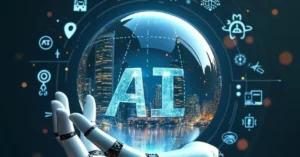Artificial Intelligence (AI) has become the buzzword of the decade. From startups promising revolutionary breakthroughs to massive investments by global corporations, the AI industry seems unstoppable. However, according to one of the world’s most respected financial leaders, this meteoric rise might not last forever. The world’s top banker recently warned that the AI bubble will eventually burst, and when it does, a massive amount of money will likely be lost.
This statement has sent ripples across the tech and finance sectors. It challenges the optimism that has fueled AI’s rapid growth and raises an important question: Are we heading toward another tech bubble, similar to the dot-com crash of the early 2000s? Even some AI companies are adopting bold internal strategies like Graphite’s onboarding roulette, reflecting how unpredictable and fast-moving the AI industry has become.
Understanding the AI Bubble
Before diving into the warning itself, it’s crucial to understand what an AI bubble actually means. A “bubble” occurs when an asset’s market value rises far beyond its actual worth, driven by hype, speculation, and unrealistic expectations.
In the case of AI, billions of dollars are being poured into startups and tools promising groundbreaking innovations—some of which may never reach practical or profitable use. The excitement surrounding technologies like machine learning, generative AI, and automation tools has created an investment frenzy that resembles earlier technological manias.
Many investors are betting heavily on AI-driven companies, expecting extraordinary returns. But just like previous financial bubbles, this enthusiasm can inflate valuations beyond what the technology currently justifies.
Why Experts Believe the AI Bubble Could Burst
The banker’s statement highlights growing concerns about overvaluation, unrealistic expectations, and unsustainable growth. Several indicators suggest that the AI market may indeed be heading for a correction.
1. Overhyped Expectations
AI has undeniably transformed industries—from healthcare and marketing to finance and entertainment. Yet, many companies overpromise what their AI systems can deliver. Investors, drawn by the hype, often back projects without fully understanding the technical limitations.
When the technology fails to meet exaggerated expectations, confidence can collapse rapidly, leading to widespread losses.
2. Excessive Investment and Speculation
History has shown that when investors chase trends rather than value, markets tend to overheat. The same pattern is now visible in AI. Startups with minimal revenue or real-world application are securing multimillion-dollar investments based on speculative potential rather than proven results.
This trend mirrors the dot-com bubble, where internet-based companies with little more than a website managed to raise enormous funding—only to collapse when reality hit.
3. Unsustainable Valuations
Some AI companies are valued at billions despite having limited products, customers, or profits. When financial markets realize these valuations are built on hype rather than substance, corrections are inevitable.
The banker’s warning serves as a reminder that no market grows indefinitely without grounding in real performance.
The Psychology of Market Hype
Human psychology plays a major role in fueling financial bubbles. The fear of missing out (FOMO) drives investors to pour money into fast-growing sectors—even when they don’t fully understand the risks.
AI’s promise of reshaping industries makes it an irresistible investment story. Everyone wants a piece of the next big thing, and that collective excitement can easily inflate asset prices beyond rational levels.
When the hype cycle peaks, even small disappointments—such as slower-than-expected progress or regulatory challenges—can trigger panic, causing prices to plummet.
Parallels Between the AI Boom and the Dot-Com Era
To understand the banker’s caution, it helps to look back at the dot-com bubble of the late 1990s. Back then, investors believed the internet would change everything—and it did. But many internet startups lacked sustainable business models, and when the bubble burst in 2000, trillions in market value disappeared.
Similarly, while AI technology is transformative, not every AI company will succeed. Some may fail due to weak management, lack of innovation, or simply because their products don’t meet real-world needs. The challenge lies in separating genuinely valuable innovations from those built on empty promises.
Just like the internet revolution, AI will survive its bubble—stronger, leaner, and more practical. But many investors may face painful lessons along the way.
The Long-Term Promise of AI Still Stands
Despite the warning, it’s important to remember that the bursting of a bubble doesn’t signal the end of an industry. It simply marks a correction—where unrealistic expectations give way to sustainable growth.
Artificial Intelligence remains a powerful tool with vast potential across industries. From predictive analytics to robotics, automation, and personalized customer experiences, AI continues to create meaningful impact.
However, as the world’s top banker suggests, investors and businesses must approach the field with realistic optimism. The goal should be to focus on long-term value creation, not short-term speculation.
What Investors Can Learn from the Warning
The banker’s statement isn’t a call to abandon AI—it’s a call to invest wisely. Here are key lessons both investors and businesses can take from this warning:
1. Focus on Fundamentals
Instead of chasing flashy projects or hyped-up startups, investors should examine the fundamentals: real products, real customers, and measurable revenue. Companies with sustainable growth models are more likely to thrive after any market correction.
2. Diversify Investments
Putting all your money into one sector—no matter how promising—creates unnecessary risk. A diversified portfolio can withstand shocks if the AI sector experiences a sudden downturn.
3. Evaluate Real-World Applications
The most successful AI projects are those that solve real problems, not just theoretical ones. Technologies that improve efficiency, enhance security, or reduce costs will hold long-term value beyond any speculative hype.
4. Be Patient
Markets tend to swing between over-enthusiasm and over-pessimism. Smart investors remain patient, buying when prices make sense and avoiding impulsive moves driven by hype.
The Role of Regulation and Transparency
Another factor that could influence the AI market’s future is government regulation. As AI becomes more integrated into daily life, issues around privacy, ethics, and data usage are gaining attention.
Stricter rules could slow down certain developments but also stabilize the industry by filtering out unreliable players. Transparency, accountability, and ethical use of AI will play a crucial role in ensuring the technology’s sustainable growth.
If companies and investors embrace responsible innovation, the eventual correction won’t destroy the industry—it will strengthen it.
Preparing for the Next Phase of AI Evolution
Even if the AI bubble bursts, it will likely lead to a healthier, more realistic phase of growth. After the dot-com crash, for example, the companies that survived—like online retailers, cloud platforms, and search engines—went on to define the modern internet economy.
The same could happen with AI. The current wave of excitement will fade, but the best innovations will endure and evolve. Businesses that focus on quality, usability, and genuine innovation will continue to thrive.
This natural cycle of boom and correction is essential for technological maturity. It weeds out weak players and rewards those building truly valuable solutions.
Conclusion
The warning from the world’s top banker serves as a timely reminder: even the most exciting technologies are not immune to market corrections. The AI boom may have inflated valuations beyond sustainable levels, and when the bubble bursts, significant money will be lost.
Yet, this isn’t a prophecy of doom—it’s a wake-up call for rational optimism. AI remains a cornerstone of future innovation, but success will depend on realistic expectations, responsible investment, and genuine value creation.
When the dust settles, the companies that focus on solving real problems—not just riding the hype will define the next era of intelligent technology.




